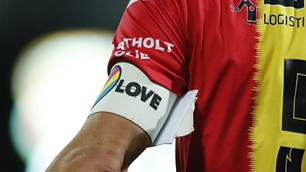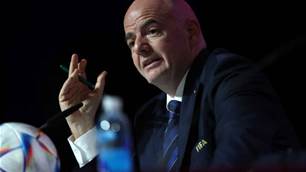FIFA have warned the Scottish FA that their plan to use videos of matches to hand out retrospective yellow cards for diving would contravene the rules of the game.
Scottish FA chief executive Gordon Smith yesterday announced a pilot scheme where referees would watch DVDs of their games and decide if any acts of simulation warrant cautions.
However, FIFA's rule-book states that if a referee has seen an incident and decided it was not a dive then he cannot change his mind after the match.
Smith's aim to introduce the scheme in January now looks to be in jeopardy.
The Scottish FA would first have to propose a rule change to the International FA Board and that does not meet until March. There is no guarantee either that they would get the rule change through what is a notoriously conservative body.
FIFA confirmed the initiative would fall foul of the current rules.
The world governing body said in a statement to PA Sport: "FIFA takes very seriously the matter of simulation and of any form of cheating in football, and actively supports and participates in many initiatives to promote fair play and eliminate cheating from our sport.
"Nevertheless, regarding this specific initiative, according to the FIFA disciplinary code, article 79, the disciplinary decisions taken by the referee on the field of play during a match are final.
"Only in certain circumstances, according to article 84, can a disciplinary committee apply certain measures. This refers specifically to incidents which have escaped the match officials' attention.
"Taking this into account, if a referee has seen an incident during a match but determined that it was not a case of simulation, this decision taken by the referee should be considered final."
FIFA's stance will not go down well with Smith, who had claimed his plans to clamp down on cheats could eventually help clean up the world game.
The former Rangers striker said yesterday: "We are hoping we will even be getting to all the players who are coming in from a culture where diving is pretty much the norm, that they will actually see that we are not going to accept it in Scotland.
"We are seeing a lot of Scottish players doing it now too and I think from that point of view we can be the first nation to really tackle this problem.
"If we get success with this, other countries could look at this and decide this is the way forward for them."
Smith added that he might bring the idea to UEFA's attention but it is FIFA he has to satisfy first.
Responding to FIFA's statement, Smith declared himself ready to meet with officials from world football's governing body to outline the SFA plans.
Smith believes FIFA can be persuaded to allow the Scottish game to lead the way in the battle to rid football of cheating.
The SFA chief executive said this afternoon: "I will happily discuss our plan with FIFA to explain the thinking behind it and what we hope to achieve.
"I am confident that they will see the benefits in supporting an initiative that aims to crack down on cheats in football and eradicate a widespread problem.
"This is a serious issue that needs to be confronted, and Scottish football could set the standard for many other countries whose game is also suffering.
"It is important to remember that we are trying this in-house to begin with, so that any issues such as this can be ironed out by a working party before the system is formally introduced in January."
Neale Barry, head of referees at the English Football Association, said today: "We are aware the SFA are introducing this experiment but we will wait and see how things develop before making any comment."
Dundee United manager Craig Levein has criticised the plans, claiming guidelines for referees are too severe already.
He told STV's Scotland Today: "Much to my dismay I read that Gordon Smith plans to introduce retrospective yellow cards. I think it's wrong.
"I already feel that clubs and players - and managers as well - are penalised for absolutely everything on the pitch.
"You can't do anything without being booked - it's ridiculous."
However, FIFA's rule-book states that if a referee has seen an incident and decided it was not a dive then he cannot change his mind after the match.
Smith's aim to introduce the scheme in January now looks to be in jeopardy.
The Scottish FA would first have to propose a rule change to the International FA Board and that does not meet until March. There is no guarantee either that they would get the rule change through what is a notoriously conservative body.
FIFA confirmed the initiative would fall foul of the current rules.
The world governing body said in a statement to PA Sport: "FIFA takes very seriously the matter of simulation and of any form of cheating in football, and actively supports and participates in many initiatives to promote fair play and eliminate cheating from our sport.
"Nevertheless, regarding this specific initiative, according to the FIFA disciplinary code, article 79, the disciplinary decisions taken by the referee on the field of play during a match are final.
"Only in certain circumstances, according to article 84, can a disciplinary committee apply certain measures. This refers specifically to incidents which have escaped the match officials' attention.
"Taking this into account, if a referee has seen an incident during a match but determined that it was not a case of simulation, this decision taken by the referee should be considered final."
FIFA's stance will not go down well with Smith, who had claimed his plans to clamp down on cheats could eventually help clean up the world game.
The former Rangers striker said yesterday: "We are hoping we will even be getting to all the players who are coming in from a culture where diving is pretty much the norm, that they will actually see that we are not going to accept it in Scotland.
"We are seeing a lot of Scottish players doing it now too and I think from that point of view we can be the first nation to really tackle this problem.
"If we get success with this, other countries could look at this and decide this is the way forward for them."
Smith added that he might bring the idea to UEFA's attention but it is FIFA he has to satisfy first.
Responding to FIFA's statement, Smith declared himself ready to meet with officials from world football's governing body to outline the SFA plans.
Smith believes FIFA can be persuaded to allow the Scottish game to lead the way in the battle to rid football of cheating.
The SFA chief executive said this afternoon: "I will happily discuss our plan with FIFA to explain the thinking behind it and what we hope to achieve.
"I am confident that they will see the benefits in supporting an initiative that aims to crack down on cheats in football and eradicate a widespread problem.
"This is a serious issue that needs to be confronted, and Scottish football could set the standard for many other countries whose game is also suffering.
"It is important to remember that we are trying this in-house to begin with, so that any issues such as this can be ironed out by a working party before the system is formally introduced in January."
Neale Barry, head of referees at the English Football Association, said today: "We are aware the SFA are introducing this experiment but we will wait and see how things develop before making any comment."
Dundee United manager Craig Levein has criticised the plans, claiming guidelines for referees are too severe already.
He told STV's Scotland Today: "Much to my dismay I read that Gordon Smith plans to introduce retrospective yellow cards. I think it's wrong.
"I already feel that clubs and players - and managers as well - are penalised for absolutely everything on the pitch.
"You can't do anything without being booked - it's ridiculous."
Copyright (c) Press Association
Related Articles

Morocco blazing a trail for Arab women's football participation

FIFA blasted for OneLove armband threat













